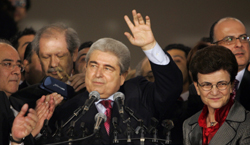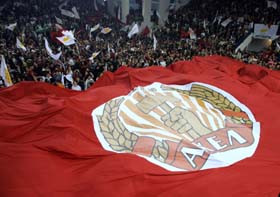
April 15, 2008
Cyprus and the Communist Electoral Victory
FIDEL VASCOS GONZALEZ
NICOSIA.— Cyprus was the scene of a significant political event within the European Union. The Secretary General of the Communist Party (AKEL), Demetris Christofias, was recently elected president by a majority vote. His victory was the first triumph of a European communist party since the disintegration of the Soviet Union and the disappearance of the Socialist Eastern Europe.
 CHRISTOFIAS
WAS ELECTED PRESIDENT OF
CHRISTOFIAS
WAS ELECTED PRESIDENT OF
CYPRUS LAST MONTH BY A MAJORITY VOTE.
After the collapse of the so-called “real socialism” in Europe, leftist forces suffered an uncertainty that divided and debilitated them. Very few communist parties of the region stayed loyal to Marxist-Leninism ideas and their goal to build a socialist society. Among those that did was the AKEL. The victory in the presidential election was reached with a campaign against neoliberal capitalism, a platform for a government with an emphasis on social concerns and international solidarity. With it a new situation was created within the EU.
AKEL won the election with a broad alliance formed with other parties and social movements including the Socialist Party (EDEK), the DIKO party of the outgoing president, the Greens, the largest labor unions, the POGO women’s organization, the youth EDON.
 THE
SUCCESS OF AKEL WAS REACHED WITH A BROAD ALLIANCE WITH OTHER CYPRUS
PARTIES AND SOCIAL MOVEMENTS.
THE
SUCCESS OF AKEL WAS REACHED WITH A BROAD ALLIANCE WITH OTHER CYPRUS
PARTIES AND SOCIAL MOVEMENTS.
Demetris Christofias is proud to be a member of AKEL but said he is not only the leader of that political organization, but instead the president of all Cyprus citizens whether they voted for him or not, and will act as such.
Christofias was born on August 29, 1946 into a working class family with progressive ideas. Since the age of 14 he joined the AKEL youth organizations. He was elected EDON secretary general in 1977, a post he held for 10 years. In 1987 he became a member of the AKEL politburo and the secretary of the central committee. He was elected the party’s secretary general in April, 1988, ratified in that post ever since.
Christofias studied at the Academy of Sciences of Moscow where he received a doctorate in Historic Sciences. He was elected president of the Cyprus parliament in 2001.
The communist leader has visited Cuba and met with Commander in Chief Fidel Castro.
It’s clear that the economic and social development program of the new Cyprus leadership does not constitute the immediate installation of a communist society and the State’s takeover of the economy.
As a member of the European Union and a participant in the Euro zone, Cyprus is obligated to meet certain economic regulations. Notwithstanding, Christofias has noted that there is room to develop policies with emphasis on social aspects that benefit the needy, as well as a state that plays a more active role in regulating the economy.
In regards to foreign policy, the priority will be on working for a reunification of the Mediterranean island, divided territorially since 1974 between the Greek-Cypriots to the south and the Turkish-Cypriots to the north. UN troops are deployed all along the border that divides the two zones, impeding direct contact between the Turkish military units, in the north and Greek Cypriot National Guard, assisted by Greece, in the south.
The declared task of Christofias is to reach the constitution of a bi-zonal and bi-communal Federal State with only one state representation in the international arena and certain autonomy for each community. Christofias said peaceful negotiations between both communities would be used to reach this goal, with the UN and UN Security Council agreements as a starting point.
Less than one month since he won the presidency, Christofias has met with Mehmet Ali Talat, leader of the Turkish-Cypriot community. The two leaders agreed to organize 13 working groups and commissions by subjects, with their sights aimed at defining the existing problems and their possible solutions.
TRANSLATION: Granma
Cypriot leaders agree to restart
unification talks
The Associated Press
Published: March 21, 2008
NICOSIA, Cyprus: The Greek and Turkish Cypriot leaders agreed Friday to restart peace talks on reunifying their ethnically split island, and to open a crossing in the heart of the divided capital.
Cypriot President Dimitris Christofias and Turkish Cypriot leader Mehmet Ali Talat met for the first time since Christofias' election last month renewed hopes that the island's three-decade long division could be resolved.
"This is a new era. We're starting for the solution of the Cyprus problem," Talat said after the meeting, held inside the U.N.-controlled buffer zone near the long-abandoned Nicosia airport. The U.N. special representative to Cyprus, Michael Moller, was also in the meeting.
Both sides agreed to open a crossing at Ledra Street, a busy pedestrian shopping street in the heart of Nicosia that runs across the capital's dividing line. Ledra has come to symbolize the island's division.
A crossing at the street will open "as soon as technically possible," Moller said. Today in Europe Italians go glumly to the polls Putin to visit Libya this week U.S. Catholics will see the softer side of a hard-line pope
The street is blocked by a wall of aluminum and plastic on either side, with a no-man's-land of abandoned buildings and rubble stretching between the two barriers.
The barriers will have to be dismantled, and the dilapidated abandoned buildings blocked off before that stretch of the street can reopen to pedestrians.
Nicosia Mayor Eleni Mavrou said on CyBC state radio that work would start Monday on dismantling the barriers and that a crossing could open the following week.
Talat and Christofias will meet again in three months, Moller said. Meanwhile, each side will set up committees to begin working together on the details of an agreement to reunify the island.
The groups will also be tasked with pinpointing potential major obstacles that the two leaders will tackle when they begin face-to-face talks.
Those obstacles include disagreement on full Turkish troop withdrawal from the north and scrapping intervention rights ceded to Britain, Greece and Turkey in the defunct U.N. plan.
Aides to the two will meet next week to set up the groups, Moller said.
The U.S. State Department said the agreement was encouraging.
"We welcome news of today's positive meeting," spokesman Sean McCormack said in a statement. "Such steps build requisite confidence between the parties to advance toward a comprehensive settlement ... The United States will continue its full support for this constructive dialogue, and for efforts by the United Nations to forge a just and lasting Cyprus settlement."
Cyprus was split into an internationally recognized Greek Cypriot south and a breakaway Turkish Cypriot north in 1974, when Turkey invaded in response to a short-lived coup by people who wanted to unite the island with Greece.
Peace talks have been stalled since 2004, when Greek Cypriot voters rejected a U.N. settlement plan in a referendum. Turkish Cypriots backed the plan.
"We shall try our utmost in order to come to an agreed solution for the interest of the Cypriot people, both communities, as soon as possible," Christofias said.
He acknowledged that the two sides still disagree on certain issues, but said that "we shall examine any possible disagreements together," adding that "we have to be optimistic."
The two leaders skirted the thornier issues to avoid jeopardizing progress, focusing instead on setting the process in motion.
"We want to underline what we agreed, not anything we disagreed," Christofias said.
Christofias, who heads the Communist-rooted AKEL party, had pledged to meet Talat within hours of winning presidential elections last month.
The two share left-wing roots and have friendly relations, but disagree on whether to base future negotiations on the last U.N. draft settlement.
Christofias is seeking a new starting point under a 2006 U.N.-brokered deal to promote confidence-building measures and prepare the ground for full-fledged negotiations.
"I hope that Mr. Talat and Christofias, as old friends, do not become enemies," Christofias said.
|